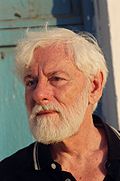For example, the rise of religious fundamentalism. In recent decades, this has happened in several countries and with several religions. Jewish fundamentalism is setting up settlements in the Occupied West Bank and threatening Israeli democracy. All over the Arab world and many other Muslim countries, Islamic fundamentalism raises its head, causing havoc. In the US, evangelical fundamentalism has created the Tea Party and is dragging the Republican Party to the extreme right, much against its own interest.
I don't know about other religions, but there are news stories about Buddhists attacking Muslims in several countries. Buddhists? I always though that this was an exceptionally peaceful creed!
How to explain these simultaneous and parallel symptoms? Commentators use the German philosophical expression, Zeitgeist ("spirit of the times"). This explains everything and nothing. Like that other great human invention, God.
So is the Zeitgeist behind the upheavals now? Don't ask me.
THERE ARE many curious similarities between the mass revolts in different countries.
They are all made by young people of the so-called middle class. Not by the poor, not by the rich. Poor people do not make revolutions -- they are too busy trying to feed their children. The Bolshevik revolution of 1917 was not made by the workers and peasants. It was made by disaffected intellectuals, many of them Jewish.
When you see a group of demonstrators in a newspaper picture, you do not know at first glance whether they are Egyptians, Israelis, Turks, Iranians or Americans. They all belong to the same social class. Young people alienated by a heartless globalization, confronted by a labor market that no longer offers the bright prospects they expect, university students for whose skills there is little demand. People with jobs, but who find it hard to "finish the month" as we say in Hebrew.
The immediate causes are varied. Israelis demonstrated against the price of cottage cheese and new apartments. Turks protest against the plan to turn a popular Istanbul park into a commercial project. Brazilians rise up against a small increase in bus fares. Egyptians are now protesting against the efforts of politicized religion to take over the state.
But at root, all these protests express a common disgust with politics and politicians, with a power elite that is seen as remote from ordinary people, with the immense power of a tiny group of the ultra-rich, with a barely understood globalization.
THE SAME mechanism that makes these revolutions possible also produces their outstanding weakness.
The model was already apparent in the Paris events of May 1968. These started with a student protest which was joined by millions of workers. There was no organization, no common ideology, no plan, no overall leadership. Activists gathered in a theater, debated endlessly, giving voice to all sorts of possible and impossible ideas. In the end there were no concrete results.
There was a certain spirit. Claude Lanzmann, the writer and director of the monumental film Shoah, once described it to me this way: The students were burning cars. So every evening I spent a lot of time finding a secure place for my car. Until I suddenly said to myself: What the hell! What do I need a car for? Let them burn it!
This spirit lingered for some time. But life went on, and the great event was soon just a memory.
This may happen again now. Again the same thing is happening everywhere: No organization, no leadership, no program, no ideology.
The very fact that everyone has a voice on Facebook seems to make it easier to agree on "against" than on "for." The young protesters are anarchist by nature. They abhor leaders, organizations, political parties, hierarchies, programs, ideologies.
You can call a demonstration on Facebook, but you cannot hammer out a joint ideology that way. But, as Lenin once remarked, without a political ideology there is no political action. And he was an expert on the art of revolution.
(Note: You can view every article as one long page if you sign up as an Advocate Member, or higher).





